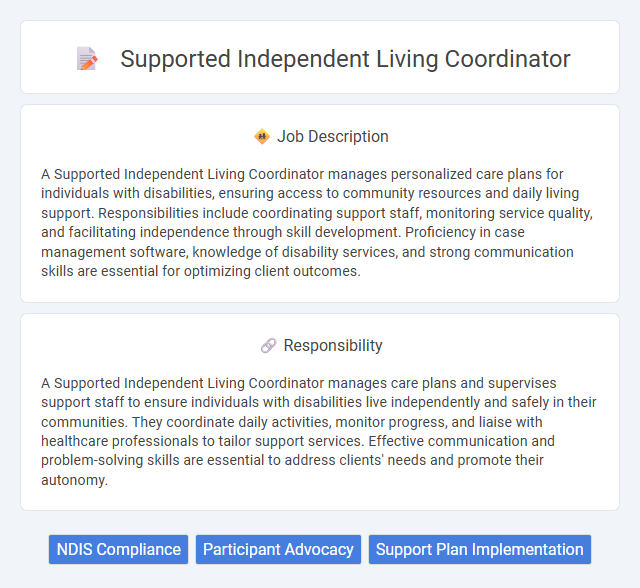
A Supported Independent Living Coordinator manages personalized care plans for individuals with disabilities, ensuring access to community resources and daily living support. Responsibilities include coordinating support staff, monitoring service quality, and facilitating independence through skill development. Proficiency in case management software, knowledge of disability services, and strong communication skills are essential for optimizing client outcomes.
Individuals with strong empathy and organizational skills are likely suitable for a Supported Independent Living Coordinator role, as it involves managing and supporting people with disabilities or mental health conditions to live independently. Those who can effectively communicate and adapt to varying needs may have a higher probability of success in this position. However, candidates lacking patience or the ability to handle complex emotional situations might find this job challenging.
Qualification
A Supported Independent Living Coordinator requires qualifications in social work, psychology, or a related human services field, often necessitating a bachelor's or master's degree. Expertise in case management, mental health support, and disability services is essential, alongside strong communication and organizational skills. Certification or training in crisis intervention and behavioral support enhances the ability to effectively coordinate personalized care plans for individuals living independently.
Responsibility
A Supported Independent Living Coordinator manages care plans and supervises support staff to ensure individuals with disabilities live independently and safely in their communities. They coordinate daily activities, monitor progress, and liaise with healthcare professionals to tailor support services. Effective communication and problem-solving skills are essential to address clients' needs and promote their autonomy.
Benefit
A Supported Independent Living Coordinator likely provides significant benefits by enhancing clients' autonomy and quality of life through personalized support plans. This role probably fosters community integration and skill development, leading to increased confidence and independence for individuals with varying needs. Employers may also experience reduced turnover and higher client satisfaction due to the coordinator's effective management and coordination skills.
Challenge
Supported independent living coordinators likely encounter challenges related to balancing the diverse needs of clients while ensuring compliance with regulatory standards. Managing limited resources and coordinating timely services can pose consistent difficulties in delivering effective support. These complexities may require strong problem-solving abilities and adaptability to navigate varying client situations successfully.
Career Advancement
Supported Independent Living Coordinators develop critical skills in case management, staff supervision, and client advocacy, positioning themselves for leadership roles within social services. Expertise in regulatory compliance and personalized care planning enhances career growth opportunities in community health organizations and government agencies. Pursuing certifications in disability support and project management further accelerates advancement into senior management and program development positions.
Key Terms
NDIS Compliance
A Supported Independent Living (SIL) Coordinator ensures all services adhere to National Disability Insurance Scheme (NDIS) compliance standards, facilitating high-quality care for participants. They manage care plans, coordinate staff training on NDIS guidelines, and maintain meticulous documentation to meet auditing requirements. Skilled in regulatory frameworks, SIL Coordinators play a crucial role in promoting participant independence while aligning with the NDIS Quality and Safeguards Commission mandates.
Participant Advocacy
Supported Independent Living Coordinators specialize in Participant Advocacy by ensuring personalized care plans that prioritize the autonomy and rights of individuals with disabilities. They act as liaisons between participants, service providers, and families, actively advocating for accessible resources and tailored support services. This role demands in-depth knowledge of disability legislation, effective communication skills, and a commitment to empowering participants in decision-making processes.
Support Plan Implementation
A Supported Independent Living Coordinator ensures effective support plan implementation by coordinating personalized services tailored to individuals' needs. They monitor progress, adjust care strategies, and collaborate with multidisciplinary teams to enhance clients' independence and quality of life. Expertise in compliance with relevant regulations and documentation is critical for successful support outcomes in supported independent living settings.
 kuljobs.com
kuljobs.com